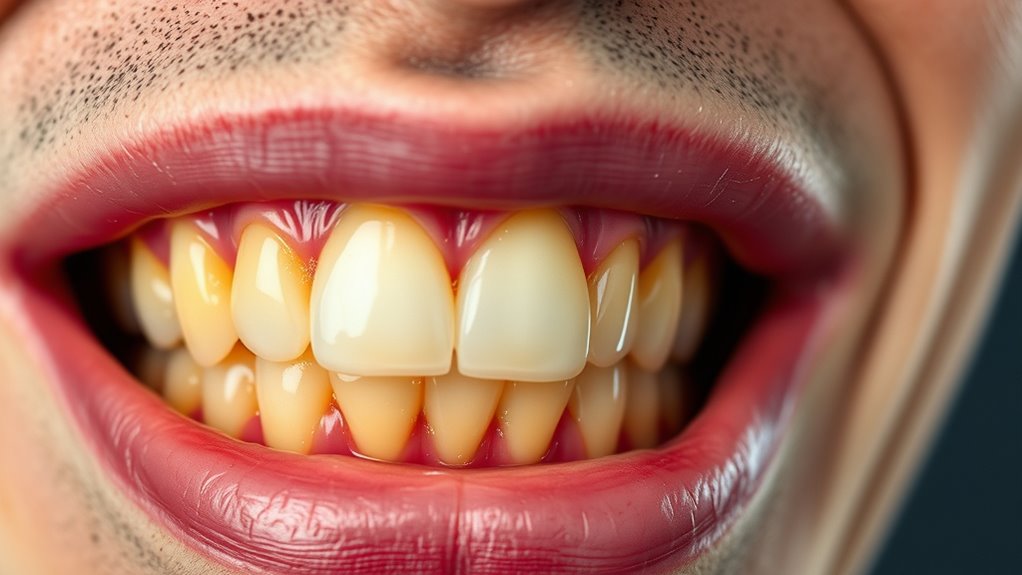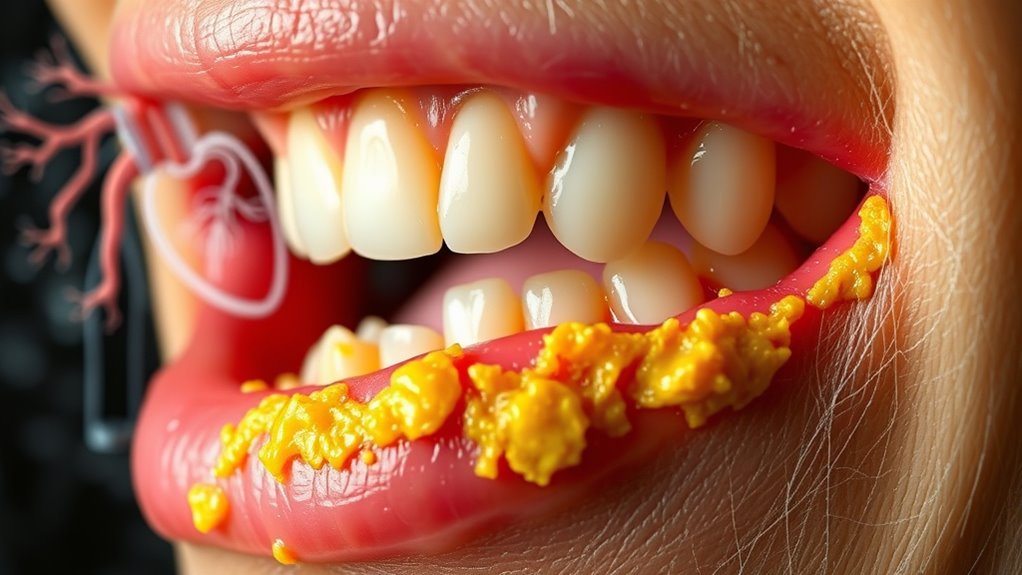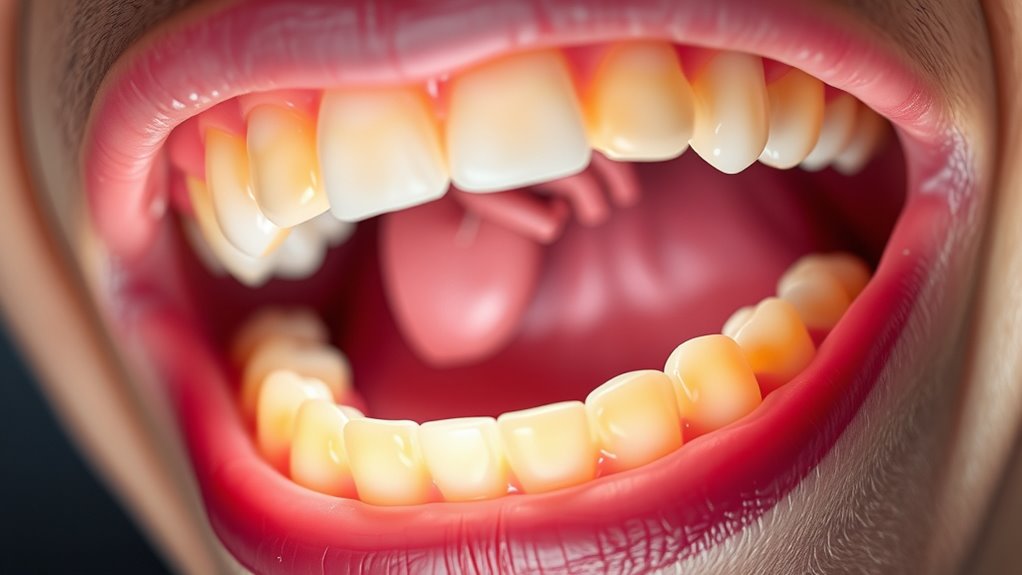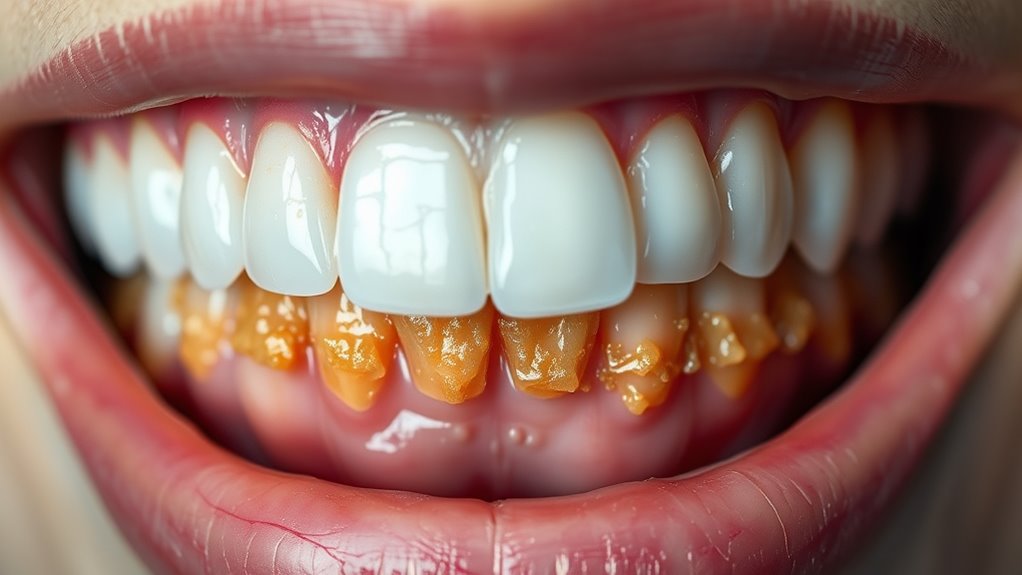Poor oral hygiene allows plaque to build up, which contains bacteria that can enter your bloodstream through inflamed gums. These bacteria promote plaque formation in your arteries, triggering inflammation and increasing your risk of heart disease. By maintaining good oral care, you can reduce harmful bacteria and systemic inflammation. Understanding how your oral health links to your heart health helps you make smarter choices—discover more about protecting your whole body from these risks.
Key Takeaways
- Dental plaque harbors bacteria that can enter the bloodstream through inflamed gums, increasing cardiovascular risks.
- Persistent oral bacteria promote arterial plaque formation, contributing to atherosclerosis and heart disease.
- Chronic gum inflammation releases inflammatory mediators into circulation, damaging blood vessels and elevating systemic health risks.
- Effective oral hygiene reduces harmful bacteria, lowering the likelihood of bacteria-induced arterial blockages.
- Regular dental care and plaque control are vital for decreasing systemic inflammation and protecting cardiovascular health.
Top picks for "dental plaque systemic"
Open Amazon search results for this keyword.
As an affiliate, we earn on qualifying purchases.
Understanding Dental Plaque and Its Composition

Dental plaque is a sticky film that forms on your teeth and gums when bacteria and food particles combine. This process is known as plaque formation and results in a complex community called oral biofilm. The biofilm develops quickly, often within 24 to 48 hours if not removed. It contains bacteria, their byproducts, and debris, which adhere tightly to your tooth surfaces. As the biofilm matures, it produces acids that can demineralize enamel and lead to cavities. Understanding how plaque forms helps you recognize the importance of regular brushing and flossing to prevent its buildup. Keeping oral biofilm under control reduces your risk of dental problems and supports overall health. Proper oral hygiene disrupts plaque formation before it hardens into tartar. Regular dental check-ups can also help in detecting early signs of plaque accumulation and prevent systemic health issues, especially considering the potential systemic health impacts associated with oral biofilm. Additionally, research indicates that the composition of dental plaque may influence systemic inflammation, which is linked to cardiovascular conditions.
How Oral Bacteria Influence Heart Health

Since oral bacteria can enter your bloodstream through inflamed or bleeding gums, they have the potential to affect your heart health. Your mouth microbiome, which includes various bacteria, can harbor species with high bacterial virulence that promote plaque formation in arteries. These bacteria can attach to arterial walls, contributing to atherosclerosis, a key factor in heart disease. When bacteria from your mouth reach your bloodstream, they can trigger immune responses that damage blood vessels and promote clot formation. Over time, this process increases your risk of heart attacks and strokes. Maintaining good oral hygiene reduces the number of harmful bacteria and limits their ability to influence your cardiovascular system. Proper oral care is essential in minimizing bacterial invasion and protecting your overall health. Additionally, self-watering plant pots can help maintain optimal moisture levels in your home, creating a healthier environment that supports overall well-being. Research into the oral microbiome further underscores the importance of oral health in preventing systemic diseases.
The Role of Inflammation in Linking Oral and Systemic Diseases

Inflammation serves as the key link between oral health and systemic diseases, acting as the body’s response to persistent bacterial infection in the mouth. When bacteria from plaque trigger your immune response, it leads to chronic inflammation that can spread beyond the mouth. This ongoing inflammation damages tissues and releases inflammatory mediators into your bloodstream, affecting other organs. Here are key points to contemplate:
- Chronic inflammation can contribute to arterial plaque buildup.
- Your immune response may become overactive, causing tissue damage.
- Inflammatory markers from oral infections can circulate systemically and impact overall health.
- Managing oral health reduces the risk of systemic inflammatory effects.
- Hackathons provide a platform for innovative solutions to health challenges, including those related to inflammation and systemic diseases.
Understanding this connection emphasizes that controlling oral infections isn’t just about teeth—it’s about safeguarding your overall health.
Evidence From Scientific Studies Connecting Plaque and Cardiovascular Risks

Numerous scientific studies have established a strong link between oral plaque buildup and increased cardiovascular risk. Plaque forms through biofilm formation, where bacteria adhere to tooth surfaces and develop complex communities. These bacterial biofilms are highly virulent, with bacterial virulence factors that can enter the bloodstream through inflamed gum tissues. Once in circulation, these bacteria or their toxins can trigger inflammatory responses that contribute to atherosclerosis and other cardiovascular conditions. Research shows that individuals with significant plaque accumulation are more likely to develop arterial blockages and heart disease. The evidence highlights how the pathogenicity of bacteria within oral biofilms directly influences systemic health, underscoring the importance of managing plaque to reduce cardiovascular risks effectively. Additionally, understanding the offensive security measures employed by ethical hackers can help develop strategies to protect sensitive health data from cyber threats. Effective plaque control remains a critical aspect of overall health maintenance, emphasizing the need for good oral hygiene practices and regular dental check-ups.
Strategies for Reducing Risks Through Oral Hygiene and Medical Care

Implementing effective oral hygiene practices and seeking regular medical care are essential steps to reduce the risks associated with plaque buildup and its impact on systemic health. Maintaining good oral health helps prevent gingivitis and reduces inflammation that can affect your cardiovascular system. To achieve this, consider these strategies:
- Brush twice daily with fluoride toothpaste to remove plaque effectively.
- Floss daily to prevent gingivitis and ensure thorough cleaning between teeth.
- Schedule regular dental visits—ideally every six months—to monitor and maintain oral health.
- Follow your dentist’s advice on oral care products and possible treatments to reduce plaque formation.
- Incorporating oral health practices that target bacterial buildup can further decrease systemic inflammation linked to cardiovascular issues.
Frequently Asked Questions
Can Dental Plaque Affect Conditions Beyond Cardiovascular Disease?
You might wonder if dental plaque affects more than just heart health. It’s true; plaque biofilms can influence your overall well-being by disrupting your oral microbiome. When plaque accumulates, harmful bacteria can enter your bloodstream, potentially impacting conditions like diabetes or respiratory issues. Maintaining good oral hygiene helps control plaque biofilms, supporting your oral microbiome and reducing risks for various systemic health problems beyond cardiovascular disease.
How Quickly Can Poor Oral Hygiene Impact Systemic Health?
Poor oral hygiene can impact your systemic health surprisingly quickly. Within days, oral bacteria can multiply and enter your bloodstream, triggering systemic inflammation. This inflammation can influence other parts of your body, potentially worsening existing conditions or increasing your risk for new health issues. Maintaining good oral hygiene helps control oral bacteria, reducing systemic inflammation and protecting your overall health more effectively.
Are Certain Populations More Vulnerable to Plaque-Related Systemic Issues?
Certain populations are more vulnerable to plaque-related systemic issues. You might be at higher risk if you have a genetic predisposition, which can influence your body’s response to plaque buildup. Age-related vulnerability also plays a role; as you get older, your immune system weakens, making it harder to fight off infections caused by plaque. Being aware of these factors can help you take proactive steps to protect your overall health.
What Are the Latest Advancements in Preventing Plaque-Related Health Risks?
You’re interested in the latest advancements in preventing plaque-related health risks. Innovative oral hygiene tools now incorporate advanced plaque detection technology, allowing you to identify and target plaque buildup more effectively. These developments help you maintain healthier teeth and gums, reducing systemic health risks. By adopting these new methods, you can stay ahead of plaque formation and improve your overall health outcomes, making oral care more efficient and personalized.
How Does Diet Influence the Formation of Harmful Dental Plaque?
Think of your mouth as a bustling city where diet sugars are the uninvited guests fueling the formation of harmful plaque. When you indulge in sugary foods, you feed bacteria that produce acids, turning your oral environment into a battleground. Food acidity accelerates plaque buildup, creating a sticky trap on your teeth. To keep this city thriving, cut back on sugars and acidic foods, and brush regularly to keep harmful invaders at bay.
Conclusion
Taking care of your oral health isn’t just about a bright smile—it’s about protecting your heart too. Imagine someone neglecting their dental hygiene and developing plaque buildup; this could lead to inflammation affecting their arteries. By brushing, flossing, and visiting your dentist regularly, you reduce your risk of cardiovascular issues. Remember, a simple daily routine can make a big difference in keeping both your mouth and heart healthy for years to come.









